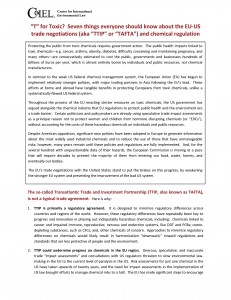
Protecting the public from toxic chemicals requires government action. The public health impacts linked to toxic chemicals—e.g. cancer, asthma, obesity, diabetes, difficulty conceiving and maintaining pregnancy, and many others—are conservatively estimated to cost the public, governments and businesses hundreds of billions of Euros per year, which is almost entirely borne by individuals and public resources, not chemical manufacturers.
In contrast to the weak US federal chemical management system, the European Union (EU) has begun to implement relatively stronger policies, with major trading partners in Asia following the EU’s lead. These efforts at home and abroad have tangible benefits in protecting Europeans from toxic chemicals, unlike a systematically flawed US federal system.
Throughout the process of the EU enacting stricter measures on toxic chemicals, the US government has argued alongside the chemical industry that EU regulations to protect public health and the environment are a trade barrier. Certain politicians and policymakers are already using speculative trade impact assessments as a principal reason not to protect women and children from hormone disrupting chemicals (or “EDCs”), without accounting for the costs of these hazardous chemicals on individuals and public resources.
Despite American opposition, significant new policies have been adopted in Europe to generate information about the most widely used industrial chemicals and to reduce the use of those that have unmanageable risks; however, many years remain until these policies and regulations are fully implemented. And, for the several hundred with unquestionable data of their hazards, the European Commission is moving at a pace that will require decades to prevent the majority of them from entering our food, water, homes, and eventually our bodies.
The EU’s trade negotiations with the United States stand to put the brakes on this progress, by weakening the stronger EU system and preventing the improvement of the bad US system.
